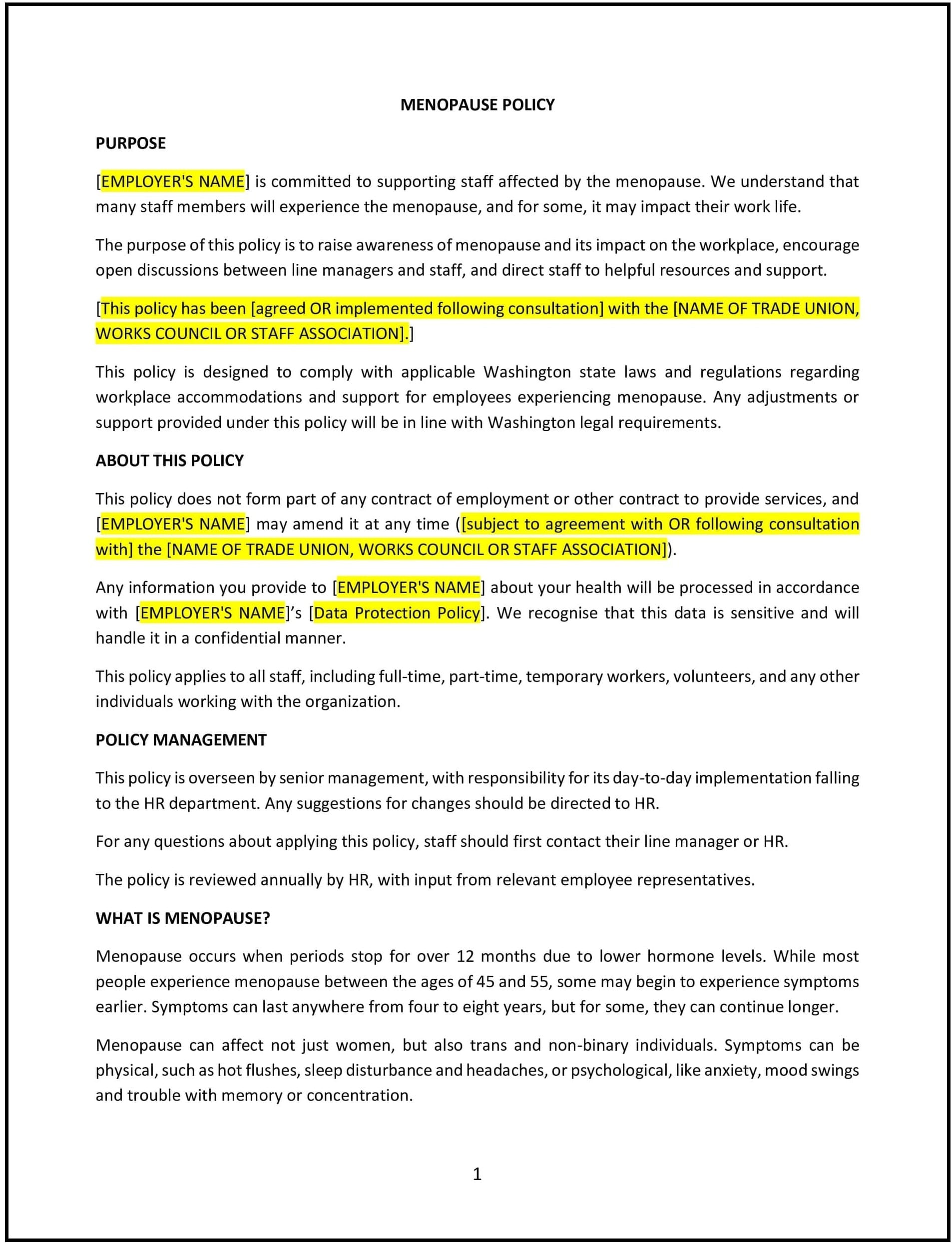Got contracts to review? While you're here for policies, let Cobrief make contract review effortless—start your free review now.

Customize this template for free
This menopause policy is designed to help Washington businesses support employees experiencing menopause-related symptoms. The policy provides guidelines for creating a workplace environment that is supportive, inclusive, and accommodating to employees navigating menopause. It addresses potential challenges, such as hot flashes, fatigue, and mood changes, and outlines reasonable accommodations that can be made to help employees manage these symptoms while maintaining productivity. The policy also encourages open communication between employees and managers, fostering a supportive workplace culture.
By adopting this policy, businesses can promote gender inclusivity, enhance employee well-being, and create a more supportive and understanding workplace environment for individuals experiencing menopause.
How to use this menopause policy (Washington)
- Define menopause and related symptoms: The policy should provide a clear definition of menopause and the symptoms that may impact employees, such as hot flashes, mood swings, fatigue, and memory issues. This helps ensure employees and managers understand what menopause entails and how it can affect work performance.
- Offer reasonable accommodations: The policy should specify the types of accommodations the company will provide for employees experiencing menopause symptoms. These accommodations may include flexible work hours, temperature control in the workplace, additional breaks, or changes to work assignments. The policy should make it clear that accommodations will be provided based on individual needs.
- Encourage open communication: The policy should emphasize the importance of open and respectful communication between employees and managers. Employees should feel comfortable discussing their needs and requesting accommodations without fear of discrimination or stigma.
- Address privacy and confidentiality: The policy should include provisions that ensure employees’ menopause-related requests and health information are treated with confidentiality and respect. Employees should not be required to disclose unnecessary details about their symptoms or medical conditions.
- Promote awareness and education: The policy should include provisions for educating managers and employees about menopause, its symptoms, and how it can impact work performance. This may involve training programs or informational resources to help create a more supportive workplace culture.
- Ensure compliance with Washington and federal laws: The policy should comply with Washington state laws, including those related to employee health and accommodation, as well as federal regulations, such as the Equal Employment Opportunity Commission (EEOC) guidelines on gender discrimination and accommodation.
- Review and update regularly: Periodically review and update the policy to ensure it remains compliant with Washington state laws, federal regulations, and any changes in company operations. Regular updates will help ensure the policy stays relevant and effective.
Benefits of using this menopause policy (Washington)
This policy offers several benefits for Washington businesses:
- Promotes a supportive work environment: The policy ensures that employees experiencing menopause receive the necessary support and accommodations, promoting a more inclusive and understanding workplace.
- Reduces employee absenteeism: By offering accommodations, businesses can reduce absenteeism caused by menopause-related symptoms, helping employees maintain productivity and engagement.
- Enhances employee retention: Employees who feel supported by their employer are more likely to remain with the company. This policy helps increase job satisfaction and retention among employees experiencing menopause.
- Improves workplace diversity and inclusion: The policy fosters a diverse and inclusive workplace by addressing gender-specific health issues and promoting equal treatment for all employees, regardless of age or gender.
- Promotes health and well-being: By acknowledging and addressing menopause-related challenges, businesses contribute to the overall well-being of their employees, improving morale and fostering a healthier work environment.
- Mitigates legal risks: The policy helps businesses avoid legal risks related to discrimination or failure to accommodate employees under applicable Washington state and federal laws.
Tips for using this menopause policy (Washington)
- Communicate the policy clearly: Ensure all employees are aware of the menopause policy and the accommodations available to them. Include the policy in the employee handbook and review it during onboarding. Provide periodic reminders and updates as necessary.
- Provide training for managers: Offer training for managers on how to recognize menopause-related symptoms and how to accommodate affected employees effectively. This ensures that managers are prepared to handle requests in a supportive and empathetic manner.
- Encourage a culture of respect: Foster a workplace culture where employees feel comfortable discussing their needs related to menopause without fear of stigma or discrimination. Encourage respectful communication and support among colleagues and managers.
- Review accommodations on a case-by-case basis: When an employee requests accommodations for menopause-related symptoms, assess their specific needs on a case-by-case basis to ensure that the accommodations are appropriate and effective.
- Monitor policy effectiveness: Regularly assess the effectiveness of the menopause policy by gathering feedback from employees and reviewing accommodation requests. This can help ensure that the policy continues to meet the needs of employees and remains aligned with company goals.
- Review and update regularly: Periodically review the policy to ensure it remains compliant with Washington state laws, federal regulations, and any changes in the company’s operations. Regular updates will help keep the policy relevant and effective.